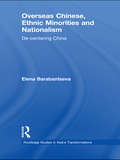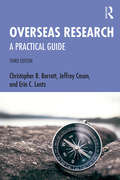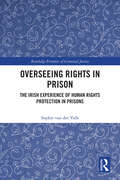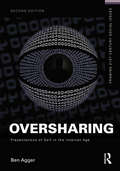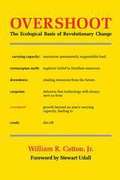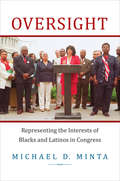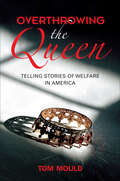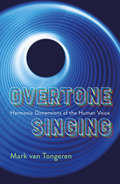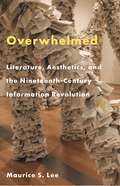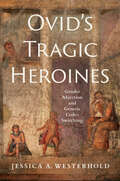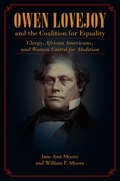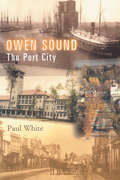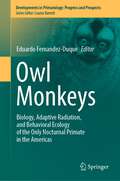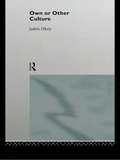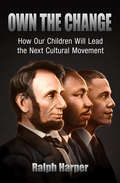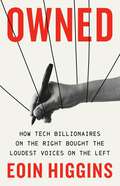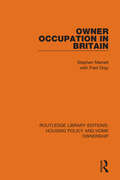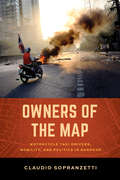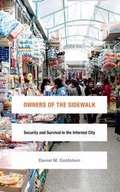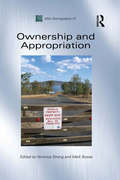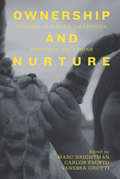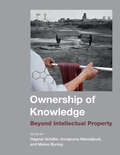- Table View
- List View
Overseas Chinese, Ethnic Minorities and Nationalism: De-Centering China (Routledge Studies in Asia's Transformations)
by Elena BarabantsevaElena Barabantseva looks at the close relationship between state-led nationalism and modernisation, with specific reference to discourses on the overseas Chinese and minority nationalities. The interplay between modernisation programmes and nationalist discourses has shaped China’s national project, whose membership criteria have evolved historically. By looking specifically at the ascribed roles of China’s ethnic minorities and overseas Chinese in successive state-led modernisation efforts, This book offers new perspectives on the changing boundaries of the Chinese nation. It places domestic nation-building and transnational identity politics in a single analytical framework, and examines how they interact to frame the national project of the Chinese state. By exploring the processes taking place at the ethnic and territorial margins of the Chinese nation-state, the author provides a new perspective on China’s national modernisation project, clarifying the processes occurring across national boundaries and illustrating how China has negotiated the basis for belonging to its national project under the challenge to modernise amid both domestic and global transformations. This book will be of interest to students and scholars of Asian politics, Chinese politics, nationalism, transnationalism and regionalism.
Overseas Research: A Practical Guide
by Christopher B. Barrett Jeffrey Cason Erin C. LentzWhen conducting research in developing countries, an ability to negotiate a bewildering array of cultural and logistical obstacles is essential. Overseas Research: A Practical Guide distills essential lessons from scores of students and scholars who have collected data and done fieldwork abroad, including how to prepare for the field, how and where to find funding for one’s fieldwork, issues of personal safety and security, and myriad logistical and relational issues. By encouraging researchers to think through the challenges of research before they begin it, Overseas Research will help prepare fieldworkers for the practical, logistical, and psychological considerations of very demanding work, help save valuable time, make the most of scarce financial resources, and enhance the quality of the field research. This third edition contains new material on social media, including representation of research subjects/collaborators, students’ digital branding and image, and representing universities abroad when posting publicly. It also covers emerging technologies such as solar panels for power in remote locations, new ways of digitally sending and receiving money, and incorporates more perspectives of women, LGBTQ+ people, and people of color researching abroad. The book will be of interest to overseas fieldworkers, and also to undergraduates in subjects such as anthropology, economics, geography, history, international studies, politics, sociology, and development studies.
Overseeing Rights in Prison: The Irish Experience of Human Rights Protection in Prisons (Routledge Frontiers of Criminal Justice)
by Sophie van der ValkDrawing on Ireland as its primary case study, this book is an in- depth critical examination of how rights protection bodies and mechanisms are experienced by those in prison in Ireland.Through its analysis of the Irish experience, the book considers the implementation of, and challenges faced by, human rights protection within the prison context, and explores some of the reforms that Ireland has undertaken in this area over the past 15 years, including the introduction of a new complaint system and establishment of an Office of the Inspector of Prisons. Using a wealth of information gathered through interviews and surveys of participants in three male prisons, the book sets out personal experiences of such mechanisms and identifies the key barriers to effective rights protection.Offering a detailed presentation of the international framework for the protection of prisoners’ rights through oversight mechanisms, and proposing methods for overcoming common barriers, Overseeing Rights in Prison: The Irish Experience of Human Rights Protection in Prisons will be of interest to students and scholars of criminology, particularly in relation to prisons and human rights.
Overshare: Love, Laughs, Sexuality and Secrets
by Rose Ellen Dix Rosie SpaughtonRose and Rosie are known for their candid and hilarious YouTube videos... but now they are taking oversharing to a whole new level. Discussing sexuality, revealing secrets and empowering others, OVERSHARE is a book packed with Rose and Rosie's unique take on friendships, fame, mental health and LGBT issues.As visibly out members of the LGBT community, they open up about their own experiences, both together and as individuals, and have written this book in the hope that it gives strength to those who have faced similar difficulties. They are spreading a message of positivity and inclusivity, and want everyone to feel comfortable in their own skin, no matter what their sexuality. Delve deep into the unfiltered highs and lows of Rose and Rosie's life: family relationships, secrets of a happy marriage, struggles with OCD and anxiety, finding love and navigating the world as a gay couple. Get ready to laugh, cry, cringe and OVERSHARE.
Overshare: Love, Laughs, Sexuality and Secrets
by Rose Ellen Dix Rosie SpaughtonRose and Rosie are known for their candid and hilarious YouTube videos... but now they are taking oversharing to a whole new level. Discussing sexuality, revealing secrets and empowering others, OVERSHARE is a book packed with Rose and Rosie's unique take on friendships, fame, mental health and LGBT issues.As visibly out members of the LGBT community, they open up about their own experiences, both together and as individuals, and have written this book in the hope that it gives strength to those who have faced similar difficulties. They are spreading a message of positivity and inclusivity, and want everyone to feel comfortable in their own skin, no matter what their sexuality. Delve deep into the unfiltered highs and lows of Rose and Rosie's life: family relationships, secrets of a happy marriage, struggles with OCD and anxiety, finding love and navigating the world as a gay couple. Get ready to laugh, cry, cringe and OVERSHARE.
Oversharing: Presentations of Self in the Internet Age (Framing 21st Century Social Issues)
by Ben AggerPeople ‘overshare’ when they interact with others through the screens of computers and smartphones. Oversharing means to divulge more of their inner feelings, opinions and sexuality than they would in person, or even over the phone. Text messaging, Facebooking, tweeting, camming, blogging, online dating, and internet porn are vehicles of this oversharing, which blurs the boundary between public and private life. This book examines these ‘presentations of self’, acknowledging that we are now much more public about what used to be private. With this second edition, Agger adds a new chapter on whether privacy is possible that addresses selfies, job loss due to oversharing, the surveillance state, and examples of when the private should go public.
Overshoot: The Ecological Basis of Revolutionary Change
by William R. CattonOur day-to-day experiences over the past decade have taught us that there must be limits to our tremendous appetite for energy, natural resources, and consumer goods. Even utility and oil companies now promote conservation in the face of demands for dwindling energy reserves. And for years some biologists have warned us of the direct correlation between scarcity and population growth. These scientists see an appalling future riding the tidal wave of a worldwide growth of population and technology. A calm but unflinching realist, Catton suggests that we cannot stop this wave - for we have already overshot the Earth's capacity to support so huge a load. He contradicts those scientists, engineers, and technocrats who continue to write optimistically about energy alternatives. Catton asserts that the technological panaceas proposed by those who would harvest from the seas, harness the winds, and farm the deserts are ignoring the fundamental premise that "the principals of ecology apply to all living things." These principles tell us that, within a finite system, economic expansion is not irreversible and population growth cannot continue indefinitely. If we disregard these facts, our sagging American Dream will soon shatter completely.
Oversight: Representing the Interests of Blacks and Latinos in Congress
by Michael D. MintaOversight answers the question of whether black and Latino legislators better represent minority interests in Congress than white legislators, and it is the first book on the subject to focus on congressional oversight rather than roll-call voting. In this important book, Michael Minta demonstrates that minority lawmakers provide qualitatively better representation of black and Latino interests than their white counterparts. They are more likely to intervene in decision making by federal agencies by testifying in support of minority interests at congressional oversight hearings. Minority legislators write more letters urging agency officials to enforce civil rights policies, and spend significant time and effort advocating for solutions to problems that affect all racial and ethnic groups, such as poverty, inadequate health care, fair housing, and community development. In Oversight, Minta argues that minority members of Congress act on behalf of broad minority interests--inside and outside their districts--because of a shared bond of experience and a sense of linked fate. He shows how the presence of black and Latino legislators in the committee room increases the chances that minority perspectives and concerns will be addressed in committee deliberations, and also how minority lawmakers are effective at countering negative stereotypes about minorities in policy debates on issues like affirmative action and affordable housing.
Overthrowing the Queen: Telling Stories of Welfare in America
by Tom MouldExamining the popular myths and unseen realities of welfare, this study reveals the political power of folklore and the possibilities of storytelling. In 1976, Ronald Reagan hit the campaign trail with an extraordinary account of a woman committing massive welfare fraud. The story caught fire and a devastating symbol of the misuse government programs was born: the Welfare Queen.Overthrowing the Queen examines these legends of fraud and abuse while bringing to light personal stories of hardship and hope told by cashiers, bus drivers, and business owners; politicians and aid providers; and, most important, aid recipients themselves. Together these stories reveal how the seemingly innocent act of storytelling can create powerful stereotypes that shape public policy. They also showcase redemptive counter-narratives that offer hope for a more accurate and empathetic view of poverty in America today.Overthrowing the Queen tackles perceptions of welfare recipients while proposing new approaches to the study of oral narrative that extend far beyond the study of welfare, poverty, and social justice.
Overtone Singing: Harmonic Dimensions of the Human Voice
by Mark Van TongerenAn indispensable guide to a deeper understanding of the nature of the human voice and its harmonic possibilities from East to West.Overtone Singing is the most comprehensive book ever written on the hidden harmonies of the human voice. Ethnomusicologist and vocalist Mark van Tongeren offers fascinating insights into the timeless and universal aspects of sound and vibration. Grounded in the author&’s decade-long study of Asian music, the book draws upon field work, interviews with Eastern and Western musicians, and copious scholarship to present a multidisciplinary vision of sound that runs from global music to the science of acoustics and perception, onward to the philosophical and spiritual dimensions of music. Written in a nontechnical style, this generously illustrated book is an indispensable guide for musicians, listeners, and performers seeking a deeper understanding of the nature of the human voice and its harmonic possibilities from East to West.
Overwhelmed: Literature, Aesthetics, and the Nineteenth-Century Information Revolution
by Professor Maurice S. LeeAn engaging look at how debates over the fate of literature in our digital age are powerfully conditioned by the nineteenth century's information revolutionWhat happens to literature during an information revolution? How do readers and writers adapt to proliferating data and texts? These questions appear uniquely urgent today in a world of information overload, big data, and the digital humanities. But as Maurice Lee shows in Overwhelmed, these concerns are not new—they also mattered in the nineteenth century, as the rapid expansion of print created new relationships between literature and information.Exploring four key areas—reading, searching, counting, and testing—in which nineteenth-century British and American literary practices engaged developing information technologies, Overwhelmed delves into a diverse range of writings, from canonical works by Coleridge, Emerson, Charlotte Brontë, Hawthorne, and Dickens to lesser-known texts such as popular adventure novels, standardized literature tests, antiquarian journals, and early statistical literary criticism. In doing so, Lee presents a new argument: rather than being at odds, as generations of critics have viewed them, literature and information in the nineteenth century were entangled in surprisingly collaborative ways.An unexpected, historically grounded look at how a previous information age offers new ways to think about the anxieties and opportunities of our own, Overwhelmed illuminates today’s debates about the digital humanities, the crisis in the humanities, and the future of literature.
Ovid and Hesiod
by Ioannis ZiogasThe influence on Ovid of Hesiod, the most important archaic Greek poet after Homer, has been underestimated. Yet, as this book shows, a profound engagement with Hesiod's themes is central to Ovid's poetic world. As a poet who praised women instead of men and opted for stylistic delicacy instead of epic grandeur, Hesiod is always contrasted with Homer. Ovid revives this epic rivalry by setting the Hesiodic character of his Metamorphoses against the Homeric character of Virgil's Aeneid. Dr Ziogas explores not only Ovid's intertextual engagement with Hesiod's works but also his dialogue with the rich scholarly, philosophical and literary tradition of Hesiodic reception. An important contribution to the study of Ovid and the wider poetry of the Augustan age, the book also forms an excellent case study in how the reception of previous traditions can become the driving force of poetic creation.
Ovid's Tragic Heroines: Gender Abjection and Generic Code-Switching
by Jessica A. WesterholdOvid's Tragic Heroines expands our understanding of Ovid's incorporation of Greek generic codes and the tragic heroines, Phaedra and Medea, while offering a new perspective on the Roman poet's persistent interest in these two characters and their paradigms. Ovid presents these two Attic tragic heroines as symbols of different passions that are defined by the specific combination of their gender and generic provenance. Their failure to be understood and their subsequent punishment are constructed as the result of their female "nature," and are generically marked as "tragic." Ovid's masculine poetic voice, by contrast, is given free rein to oscillate and play with poetic possibilities. Jessica A. Westerhold focuses on select passages from the poems Ars Amatoria, Heroides, and Metamorphoses. Building on existing scholarship, she analyzes the dynamic nature of generic categories and codes in Ovid's poetry, especially the interplay of elegy and epic. Further, her analysis of Ovid's reception applies the idea of the abject to elucidate Ovid's process of constructing gender and genre in his poetry. Ovid's Tragic Heroines incorporates established theories of the performativity of sex, gender, and kinship roles to understand the continued maintenance of the normative and abject subject positions Ovid's poetry creates. The resulting analysis reveals how Ovid's Phaedras and Medeas offer alternatives both to traditional gender roles and to material appropriate to a poem's genre, ultimately using the tragic code to introduce a new perspective to epic and elegy.
Owen Lovejoy and the Coalition for Equality: Clergy, African Americans, and Women United for Abolition
by Jane Moore William MooreAntislavery white clergy and their congregations. Radicalized abolitionist women. African Americans committed to ending slavery through constitutional political action. These diverse groups attributed their common vision of a nation free from slavery to strong political and religious values. Owen Lovejoy’s gregarious personality, formidable oratorical talent, probing political analysis, and profound religious convictions made him the powerful leader the coalition needed. Owen Lovejoy and the Coalition for Equality examines how these three distinct groups merged their agendas into a single antislavery, religious, political campaign for equality with Lovejoy at the helm. Combining scholarly biography, historiography, and primary source material, Jane Ann and William F. Moore demonstrate Lovejoy's crucial role in nineteenth-century politics, the rise of antislavery sentiment in religious spaces, and the emerging commitment to end slavery in Congress. Their compelling account explores how the immorality of slavery became a touchstone of political and religious action in the United States through the efforts of a synergetic coalition led by an essential abolitionist figure.
Owen Sound: The Port City
by Paul WhiteThe beginning of Owen Sound can be traced to the 1840 historical meeting, in a small forest clearing, between surveyor Charles Rankin and land agent John Telfer. Owen Sound: The Port City begins with the Native Peoples of the area and moves through pioneer settlement to the creation of a city in this more northerly area of central Ontario. The influence of Georgian Bay and the beginning of marine commerce, combined with the coming of the railway, led to rapid industrial growth. The memorable stories of interesting personalities, determined entrepreneurs and local rivalries create a compelling look at Owen Sound both past and present. For the citizens of Owen Sound, adversity became a challenge to be overcome and transformed into prosperity.
Owl Monkeys: Biology, Adaptive Radiation, and Behavioral Ecology of the Only Nocturnal Primate in the Americas (Developments in Primatology: Progress and Prospects)
by Eduardo Fernandez-DuqueThis book integrates three decades of owl monkey research conducted since 1994 when the first and only book focused on the genus Aotus was published. Owl monkeys were one of the least understood primates then; knowledge from wild populations was only beginning to emerge and there had been some substantial research in colonies of captive individuals. The situation is very different today. Research on captive owl monkeys has continued to develop, with valuable contributions to the health and medical sciences. And there is now enough information on the behavior, ecology, conservation, and biogeography of the genus that merits a synthesis. The book synthesizes new field data on the biogeography, behavioral ecology, circadian biology, population biology and demography spanning their entire continental range from Panamá to Argentina. It includes theoretical perspectives drawn from evolutionary biology, biological anthropology, anatomy, morphology and physiology, genetics, endocrinology and conservation biology to examine a specic set of adaptations that have allowed owl monkeys to exploit the nocturnal niche while functioning in a pair-living sexually monogamous system with remarkable patterns of paternal care. The author, with 30 years of research experience with both captive and wild primates, has directed the longest project on any owl monkey species and has conducted extensive original research on their biology, adaptive radiation and behavioral ecology. His expertise and published record on both wild populations and laboratory colonies makes this book one of a kind; it presents information from both captive and wild primates and explores questions through the integration of both approaches. The volume offers some additional features that make it novel in its approach: (1) brings together a combination of senior researchers who during four decades have established captive owl monkeys as a system of study with a new generation of younger scientists who have, for the last 10-20 years, been spearheading their study in the wild, (2) presents the work of a remarkably diverse range of authors representing all countries where owl monkeys are present, as well as researchers from the U.S and Europe, and (3) offers “synthesis” chapters; in doing so, it will surely become a reference book for those specifically drawn to owl monkeys, as well as for those interested in the research topics that are covered.
Own or Other Culture
by Judith OkelyOwn or Other Culture challenges those anthropologists who suggest that fieldwork in the 'West' is easy or merely a reiteration of what is already 'known' to either Westerners or non Westerners. Revealing some pioneering articles in social anthropology written over a period of twenty years, Judith Okely discusses selected themes which include: * questions of reflexivity and autobiography * anthropology in Europe * the cultural location of the anthropologist * feminism in anthropology. Illustrated with photographs, Own or Other Culture covers subjects ranging from the author's own boarding school revealing a British exotica and colonial comparisons, to how Gypsies, who treat non-Gypsies as the 'other', act to create or manipulate cultural difference. Feminist anthropology is developed in a reassessment of de Beauvoir and Kaberry while gender and bodily experience is explored in the face of popular demands by women readers for cross-cultural examples.
Own the Change: How Our Children Will Lead the Next Cultural Movement
by Ralph Harper&“Powerful . . . If half of Harper&’s vision is realized, the societal and economic changes could redefine the idea of inclusion in the USA.&”—Ebenezer Ekuban, former NFL player (Dallas Cowboys, Denver Broncos, and Cleveland Browns) A powerful leader, public speaker, and mentor, Ralph Harper has launched his plan for a more literate, more inclusive, more crime-free America. In this important book, he outlines the journey of black Americans, from the bonds of slavery to the first black president, to the current struggles black Americans—including the author—have experienced. In Own the Change: How Our Children Will Lead the Next Cultural Movement, Harper points out that the seventh decade of each century has brought great change for black Americans. Now, as we approach the 2060s, we must raise the next generations in a way that will set them up for success. His seven life principles—which emphasize a sense of duty, accountability, education, and hard work—will benefit people of every race, creed, and social status. A must-read for students of black history and for anyone interested in social change, this book outlines steps readers can take right now to make America the &“perfect union&” of equality and prosperity it has always had the potential to be. &“An essential, must-read book for the sake of our children and all of us.&”—Bonnie Hearn Hill, KMPH-TV Great Day Book Club
Owned: How Tech Billionaires on the Right Bought the Loudest Voices on the Left
by Eoin HigginsA &“devastating&” (Nation) examination of how a cabal of tech-billionaires is colluding with once-idealistic journalists to create an entirely new media landscapeOwned is the story of the underreported and growing collusion between new wealth and new journalism. In recent years, right-wing billionaires like Elon Musk, Peter Thiel, Marc Andreessen, and David Sacks have turned to media as their next investment and source of influence. Their cronies are Glenn Greenwald and Matt Taibbi—once known as idealistic and left-leaning voices, now beneficiaries of Silicon Valley largesse. Together, this new alliance aims to exploit the failings of traditional journalism and undermine the very idea of an independent and fact-based fourth estate.Owned examines how this shift has allowed spectacularly wealthy reactionaries to pursue their ultimate goal of censoring critics so to further their own business interests—and personal vendettas—entirely unimpeded while also advancing a toxic and antidemocratic ideology. A rich history of the decades-long rise of this new right-wing alternative media takeover, Owned follows the money, names names, and offers a chilling portrait of a future social media and news landscape. It is a biting exposé of journalistic greed, tech-billionaire ambition, and a lament for a disappearing free press.
Owner-Occupation in Britain
by Stephen MerrettOriginally published in 1982, this is a companion volume to State Housing in Britain. Together the 2 volumes cover the tenure of some 85% of all British households in much of the 20th Century. The development of the tenure between 1918 and 1970 with special reference to its position in state housing policies is examined. Subsequent chapters analyse effective demand since 1970, both with respect to its demographic base and as regards the capacity to buy. In particular the question of why people want to buy is asked and the supply of housing (both council houses and former private rented accommodation) as well as the output of speculative housebuilders is considered. A detailed survey of the perturbations in the housing market during the volatile experience of the British economy since 1970 is also covered.
Owners of the Map: Motorcycle Taxi Drivers, Mobility, and Politics in Bangkok
by Claudio SopranzettiOn May 19, 2010, the Royal Thai Army deployed tanks, snipers, and war weapons to disperse the thousands of Red Shirts protesters who had taken over the commercial center of Bangkok to demand democratic elections and an end to inequality. Key to this mobilization were motorcycle taxi drivers, who slowed down, filtered, and severed mobility in the area, claiming a prominent role in national politics and ownership over the city and challenging state hegemony. Four years later, on May 20, 2014, the same army general who directed the dispersal staged a coup, unopposed by protesters. How could state power have been so fragile and open to challenge in 2010 and yet so seemingly sturdy only four years later? How could protesters who had once fearlessly resisted military attacks now remain silent? Owners of the Map provides answers to these questions—central to contemporary political mobilizations around the globe—through an ethnographic study of motorcycle taxi drivers in Bangkok. Claudio Sopranzetti advances an analysis of power that focuses not on the sturdiness of hegemony or the ubiquity of everyday resistance but on its potential fragility and the work needed for its maintenance.
Owners of the Sidewalk: Security and Survival in the Informal City
by Daniel M. GoldsteinMany of Bolivia's poorest and most vulnerable citizens work as vendors in the Cancha mega-market in the city of Cochabamba, where they must navigate systems of informality and illegality in order to survive. In Owners of the Sidewalk Daniel M. Goldstein examines the ways these systems correlate in the marginal spaces of the Latin American city. Collaborating with the Cancha's legal and permanent stall vendors (fijos) and its illegal and itinerant street and sidewalk vendors (ambulantes), Goldstein shows how the state's deliberate neglect and criminalization of the Cancha's poor--a practice common to neoliberal modern cities--makes the poor exploitable, governable, and consigns them to an insecure existence. Goldstein's collaborative and engaged approach to ethnographic field research also opens up critical questions about what ethical scholarship entails.
Ownership and Appropriation (ASA Monographs #7)
by Veronica StrangIn a world of finite resources, expanding populations and widening structural inequalities, the ownership of things is increasingly contested. Not only are the commons being rapidly enclosed and privatized, but the very idea of what can be owned is expanding, generating conflicts over the ownership of resources, ideas, culture, people, and even parts of people. Understanding processes of ownership and appropriation is not only central to anthropological theorizing but also has major practical applications, for policy, legislative development and conflict resolution.Ownership and Appropriation significantly extends anthropology's long-term concern with property by focusing on everyday notions and acts of owning and appropriating. The chapters document the relationship between ownership, subjectivities and personhood; they demonstrate the critical consequences of materiality and immateriality on what is owned; and they examine the social relations of property. By approaching ownership as social communication and negotiation, the text points to a more dynamic and processual understanding of property, ownership and appropriation.
Ownership and Nurture: Studies in Native Amazonian Property Relations
by Marc Brightman Vanessa Grotti Strong Carlos FaustoThe first book to address the classic anthropological theme of property through the ethnography of Amazonia, Ownership and Nurture sets new and challenging terms for anthropological debates about the region and about property in general. Property and ownership have special significance and carry specific meanings in Amazonia, which has been portrayed as the antithesis of Western, property-based, civilization. Through carefully constructed studies of land ownership, slavery, shamanism, spirit mastery, aesthetics, and intellectual property, this volume demonstrates that property relations are of central importance in Amazonia, and that the ownership of persons plays an especially significant role in native cosmology.
Ownership of Knowledge: Beyond Intellectual Property
by Dagmar Schäfer, Annapurna Mamidipudi, and Marius BuningA framework for knowledge ownership that challenges the mechanisms of inequality in modern society.Scholars of science, technology, medicine, and law have all tended to emphasize knowledge as the sum of human understanding, and its ownership as possession by law. Breaking with traditional discourse on knowledge property as something that concerns mainly words and intellectual history, or science and law, Dagmar Schäfer, Annapurna Mamidipudi, and Marius Buning propose technology as a central heuristic for studying the many implications of knowledge ownership. Toward this end, they focus on the notions of knowledge and ownership in courtrooms, workshops, policy, and research practices, while also shedding light on scholarship itself as a powerful tool for making explicit the politics inherent in knowledge practices and social order. The book presents case studies showing how diverse knowledge economies are created and how inequalities arise from them. Unlike scholars who have fragmented this discourse across the disciplines of anthropology, sociology, and history, the editors highlight recent developments in the emerging field of the global history of knowledge—as science, as economy, and as culture. The case studies reveal how notions of knowing and owning emerge because they reciprocally produce and determine each other&’s limits and possibilities; that is, how we know inevitably affects how we can own what we know; and how we own always impacts how and what we are able to know.ContributorsDagmar Schäfer, Annapurna Mamidipudi, Cynthia Brokaw, Marius Buning, Viren Murthy, Marjolijn Bol, Amy E. Slaton, James Leach, Myles W. Jackson, Lissant Bolton, Vivek S. Oak, Jörn Oeder
